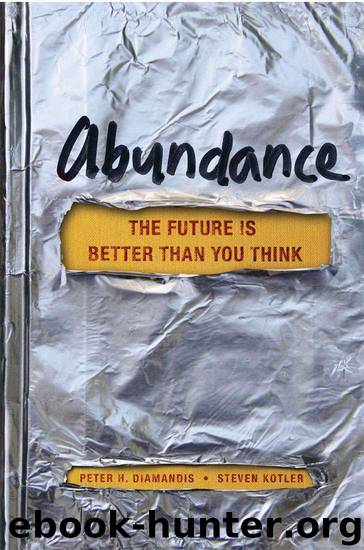Abundance: The Future Is Better Than You Think by Peter H. Diamandis; Steven Kotler

Author:Peter H. Diamandis; Steven Kotler
Language: eng
Format: mobi
Tags: Non-Fiction, Sociology, Science, 21st Century, v.5, Amazon.com, Retail, Technology
ISBN: 9781451614213
Publisher: Free Press
Published: 2012-02-20T15:00:00+00:00
In 2006 Salman Khan was a successful hedge fund analyst living in Boston, with younger cousins living in New Orleans whom he’d agreed to help in school. Khan began tutoring them remotely by making simple digital videos. Usually no more than ten minutes long, these self-narrated videos consisted of an animated digital chalkboard on which he would draw equations, chemical reactions, and the like. Kahn taught the basic subjects covered in school. Because he saw no reason not to make the tutorials public, he began posting them on YouTube. Surprisingly, his cousins preferred Khan on YouTube to him tutoring them in person.
“Once you get over the backhand nature of that,” Khan told audiences at TED 2011, “there’s actually something profound. They were saying they preferred the automated version of their cousin to their cousin … [F]rom their point of view, this makes a ton of sense. You have this situation where they can pause and repeat their cousin. If they have to review something they learned a couple of weeks ago or a couple of years ago, they don’t have to be embarrassed and ask their cousin, they can just watch those videos. If they’re bored, they can skip ahead. They can watch on their own time and at their own pace.”
The tutorials struck a nerve. Very quickly, the Khan Academy, as it is now known, became an underground Internet sensation. By 2009, over fifty thousand people a month were watching the videos. A year later, the number had risen to two hundred thousand a month. A year after that, it had grown to a million. As of summer 2011, the Khan Academy was pulling in over two million visitors a month—exponential growth driven almost entirely by word of mouth.
As users have grown, so have the subjects covered. The academy now has 2,200 videos on topics ranging from molecular biology, to American history, to quadratic equations. They are adding three lessons a day—roughly 1,000 a year—and have plans to open up the site and begin crowdsourcing content. “Our vision is a free virtual school,” says President and COO Shantanu Sinha. “We want to get enough content up that anyone in the world can start at one plus one equals two and go all the way through quantum mechanics. We also want to translate the site into the ten most common languages [Google is now driving this effort] and then crowdsource further translation into hundreds of languages. We think, at that level, the site is scalable into billions of visitors a month.”
And for those who prefer their education in a physical setting, the Khan Academy has recently partnered with the Los Altos School District in Northern California. Together they are taking an approach that inverts the two-hundred-year-old schoolhouse model. Instead of teachers using classroom time to deliver lectures, students are assigned to watch Khan Academy videos as homework, so that class time can be spent solving problems (also provided by Khan) and getting points along the way (ten correct answers earns them a merit badge).
Download
This site does not store any files on its server. We only index and link to content provided by other sites. Please contact the content providers to delete copyright contents if any and email us, we'll remove relevant links or contents immediately.
Learning SQL by Alan Beaulieu(6280)
Weapons of Math Destruction by Cathy O'Neil(6264)
Digital Minimalism by Cal Newport;(5749)
iGen by Jean M. Twenge(5408)
Sapiens by Yuval Noah Harari(5366)
The Age of Surveillance Capitalism by Shoshana Zuboff(4275)
Elon Musk by Ashlee Vance(4121)
Thing Explainer by Randall Munroe(3930)
Apollo 8 by Jeffrey Kluger(3702)
Future Crimes by Marc Goodman(3592)
The Science Book (Big Ideas Simply Explained) by DK(3277)
The Innovators: How a Group of Hackers, Geniuses, and Geeks Created the Digital Revolution by Walter Isaacson(3153)
Who Can You Trust? by Rachel Botsman(3129)
I Live in the Future & Here's How It Works by Nick Bilton(2993)
Infinite Energy Technologies by Finley Eversole(2974)
Steve Jobs by Walter Isaacson(2889)
Dawn of the New Everything by Jaron Lanier(2770)
Chernobyl by Serhii Plokhy(2534)
Ben Franklin's Almanac by Candace Fleming(2522)
